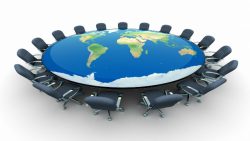 Are we, as a society, hurtling towards a centralized world government with digital control? The answer may be “yes,” but let’s discuss this question in a little more relevant detail.
Are we, as a society, hurtling towards a centralized world government with digital control? The answer may be “yes,” but let’s discuss this question in a little more relevant detail.
The Terminology
On TV channels and in the newspapers, you probably have been hearing, terms like global village, global marketplace, one world, one world currency, and so on, mentioned more frequently than in previous years. Why is that? Is it that we are heading towards a centralized world government with possible control in the hands of a world renowned political figure, who will be accepted by people all over the world?
The Process
The underlying process is the unification of all systems financial, incorporating and enabling seamless ways to send and receive money globally. This is very much a reality today and unheard of a generation ago. People can, so easily, send money across international borders legitimately and by legal means, just by filling out an online form and pressing the all mighty “Submit” button. Where does the money get debited from and credited to? From the sender’s’ bank account operated through his plastic card number (Visa debit, for example) and into the receivers account operated by another plastic card number (MasterCard debit, for example). In short “digitally.”
Our world as we know it, is divided into seven continents, but as far as financial transactions go, the planet is now becoming more “one world” rather than separate countries and continents as was the case – financially speaking, just a generation ago. Is it possible this could give rise to a centralized world government with digital control? Let’s take this discussion a little further.
Centralized World Government with a Little Imagination
It is common knowledge that most countries in the world have a government controlled Reserve or Central Bank as the leading authority for creation, enforcement, and management of national financial policies in the country. All financial directives for the country originate at this bank, nationally.
It is probably true that in most countries today, you still need a little hard cash to buy and sell commodities in the market and pay certain utility bills. It may also be true that financial transactions can also be conducted using a plastic card or using digital money. At the very least, you can get your cash at a local ATM (automatic teller machine) so you can then use the cash to meet your daily needs.
Now let us imagine that the central government in that country has issued a decree that all currency is to be demonetization and all transactions should be done electronically using digital money. This will root out corruption and hoarding of illegal cash within the country, and will be a big blow to citizens who have avoided paying tax on cash earnings. This measure will probably stamp out the cash economy, but will encourage legitimate financial transactions through digital control. This makes a centralized world government with digital control a possibility and perhaps even attractive.
Centralized World Government with Imagination Running Wild
Did you know that, as per the World Bank, the “Global Community” has made a commitment to end extreme poverty by pledging $75 billion? Stretch your imagination some more, and let’s just imagine that some new person takes over the World Bank legitimately and surprises the whole world with his fantastic monetary policies and deep financial vision for the world.
He then brings in a new policy to unify the world’s financial network in such a way that no man may buy or sell using cash, but only digital currency, worldwide. In this way, he would then succeed in unifying the world using a centralized world government with digital control.
Conclusion
We can conclude that the answer to the question raised earlier, would be more of a “yes” that we are, in all probability moving fast towards a centralized world government with digital control. It appears that eventually, most of the world’s industrialized nations will move to a cashless society and a single monetary system. A centralized world government can’t be far behind.

 Email article
Email article



